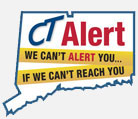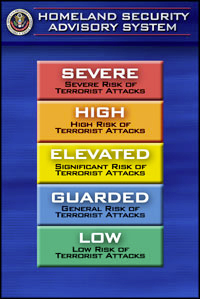Emergency Preparation & Resources
Ridgefield Alerts:
RIDGEFIELD ALERTS enables you to select multiple means of communication to receive Emergency Alerts and Community Notifications.
In addition to your home phone, you can add cell phones, Voice over IP landlines, e-mail and/or text messaging to the methods the RIDGEFIELD ALERTS system uses to send you critical, actionable information about emergencies and other important town information.
The CT Alert ENS:
The State of Connecticut Emergency Notification System (CT ALERT ENS) is a state-of-the-art notification system to alert residents about life-threatening emergency conditions. Emergency alerts can be sent to you via any communication method, such as cell phone, email, text message, or certain hearing impaired receiving devices. Simply click here or on the logo below to sign up. 
- Coordinated by the Health Department and public health staff with support from the Ridgefield Visiting Nurses Association
- Fully equipped with the supplies necessary to operate the clinic
- Mobile Communication and a Health Alert Network System provide ability to communicate with partner response agencies
- Educational material about the health emergency at hand will be provided
Volunteers are always needed. Nurses, physicians, pharmacists, mental health workers and non-medical volunteers are welcomed. To become a volunteer, contact the Health Department at (203) 431-2745.
Important Local Contact Information:
- Ridgefield Police Department (Non Emergency): (203) 438-6531
- Ridgefield Fire Department Dispatch: (203) 431-2724
- Ridgefield Town Hall: (203) 431-2700
- Danbury Hospital: (203) 739-7000
- Ridgefield Health Department: (203) 431-2745
Community Emergency Response Team (CERT)
The Ridgefield Connecticut Community Emergency Response Team was organized in 2007 by career officers and volunteer members of the Department of Emergency Management. The mission of Ridgefield CERT is to serve the citizens of Ridgefield and the surrounding towns in times of disaster, community emergencies and town-wide events. The Ridgefield CERT team is trained in conjunction with the Citizen Corps program put forward by the Department of Homeland Security and Emergency Management. Call (203) 431-2700 if you would like more information or are interested in volunteering with the Ridgefield CERT team.
Ridgefield Emergency Preparedness Sheet
Emergency Preparedness starts in the home:
Click HERE for a printable tri-fold with Emergency Preparedness information for you and your family. Print it out and keep it nearby for easy access (copies are also available at Town Hall).
View and print a copy of the FEMA brochure: "Preparing Makes Sense. Get Ready Now."
For more Information call 1-800-BE-READY
The Department of Homeland Security is working hard to strengthen our Nation's security. Whenever possible, we want to stop terrorist attacks before they happen. All Americans should begin a process of learning about potential threats so we are better prepared to react during an attack. While there is no way to predict what will happen, or what your personal circumstances will be, there are simple things you can do now to prepare yourself and your loved ones.
Homeland Security
Office of Emergency Management
Department of Public Safety

Some of the things you can do to prepare for the unexpected, such as assembling a supply kit and developing a family communications plan, are the same for both a natural or man-made emergency. However, as you will see by using the links below, there are important differences among potential terrorist threats that will impact the decisions you make and the actions you take. With a little planning and common sense, you can be better prepared for the unexpected.
Read the information below and click on the links to the Ready America website. This information will help you make informed decisions in the event of a threat or disaster.
GET A KIT
- Water, one gallon of water per person per day for at least three days, for drinking and sanitation
- Food, at least a three-day supply of non-perishable food
- Battery-powered or hand crank radio and a NOAA Weather Radio with tone alert and extra batteries for both
- Flashlight and extra batteries
- First Aid Kit
- Whistle to signal for help
- Dust Mask to help filter contaminated air and plastic sheeting and duct tape to shelter-in-place
- Moist towelettes, garbage bags and plastic ties for personal sanitation
- Wrench or pliers to turn off utilities
- Can opener for food (if kit contains canned food)
- Local maps
- Cell phone with chargers, inverter or solar charger
MAKE A PLAN
- Identify an out-of town contact. It may be easier to make a long-distance phone call than to call across town, so an out-of-town contact may be in a better position to communicate among separated family members.
- Be sure every member of your family knows the phone number and has a cell phone, coins, or a prepaid phone card to call the emergency contact. If you have a cell phone, program that person(s) as "ICE" (In Case of Emergency) in your phone. If you are in an accident, emergency personnel will often check your ICE listings in order to get a hold of someone you know. Make sure to tell your family and friends that you’ve listed them as emergency contacts.
- Teach family members how to use text messaging (also knows as SMS or Short Message Service). Text messages can often get around network disruptions when a phone call might not be able to get through.
- Subscribe to alert services. Many communities now have systems that will send instant text alerts or e-mails to let you know about bad weather, road closings, local emergencies, etc. Sign up by visiting your local Office of Emergency Management web site.
BE INFORMED
Some of the things you can do to prepare for the unexpected, such as making an emergency supply kit and developing a family communications plan, are the same for both a natural or man-made emergency.
However, there are important differences among potential emergencies that will impact the decisions you make and the actions you take. Learn more about the potential emergencies that could happen where you live and the appropriate way to respond to them.
In addition, learn about the emergency plans that have been established in your area by your state and local government.Emergency preparedness is no longer the sole concern of earthquake prone Californians and those who live in the part of the country known as "Tornado Alley." For Americans, preparedness must now account for man-made disasters as well as natural ones. Knowing what to do during an emergency is an important part of being prepared and may make all the difference when seconds count.
Department of Emergency Management and Homeland Security
25 Sigourney Street – 6th FL
Hartford, CT 06106-5042
(860) 256-0800 or (800) 397-8876
http://www.ct.gov/demhs
Emergency Websites:
Emergency Preparedness Websites:
- Federal Emergency Management Agency (FEMA)
- FEMA for KIDS
- FEMA Nation Flood Insurance Program
- FEMA Tropical Storm Watch
- FEMA en Español
- READY.GOV Are You Ready?
- National Oceanic and Atmospheric Administration –National Weather Service
- National Hurricane Center
- Saffir-Simpson Hurricane Scale
- Storm Watch



